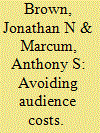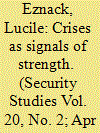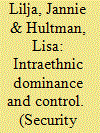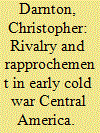| Srl | Item |
| 1 |
ID:
105849


|
|
|
| 2 |
ID:
105852


|
|
|
|
|
| Publication |
2011.
|
| Summary/Abstract |
Affect exists among close allies and influences their actions and reactions vis-à-vis each other. These countries' perceptions of, and affective attachment to, the specialness of their relationships explains why, in certain circumstances, big clashes occur among them. In this sense, affect explains why crises among close allies are more signals of strength than weakness: the passionate nature of such crises-as opposed to more routine or recurrent disagreements-is triggered by the high value placed by close allies on their ties and not, as often stated in the literature, by the erosion of these ties. After developing this argument, I illustrate it with the analysis of two crises among close allies: the Suez crisis between Britain and the United States in late 1956, and the Iraq crisis between France and the United States in early 2003. I then contrast these episodes with a crisis between two allies with a much less affectively charged relationship-the United States and Turkey, also in early 2003 over the Iraq War issue.
|
|
|
|
|
|
|
|
|
|
|
|
|
|
|
|
| 3 |
ID:
105850


|
|
|
| 4 |
ID:
105851


|
|
|
|
|
| Publication |
2011.
|
| Summary/Abstract |
Under what conditions does a common threat cause rival states to achieve rapprochement? To inform not only contemporary policy debates about coalition-building against terrorism and insurgency, but also theoretical debates about obstacles to cooperation and conflict resolution, this article examines the pattern of rivalry and rapprochement among Central American states-non-Communist allies under the Rio Treaty-in the shadow of the Cuban Revolution of 1959. Given a common threat, why did Honduras and Nicaragua shift from rivalry to rapprochement while Costa Rica and Nicaragua, and El Salvador and Honduras, did not? Drawing on rarely explored published primary sources in English and Spanish, the article argues that the major obstacle to cooperation was the parochial interest of the armed forces in perpetuating the old mission of international rivalry despite the attractive new mission of internal security, and that presidents were able to achieve rapprochement only where state resource constraints compelled a trade-off between the old and new missions. This argument is tested against realist alternatives including balancing and bandwagoning, and liberal alternatives including democratic peace and counterrevolutionary ideology. The article demonstrates that spoilers within the state can perpetuate international conflict, but also indicates conditions under which they can be convinced to support international cooperation.
|
|
|
|
|
|
|
|
|
|
|
|
|
|
|
|
| 5 |
ID:
105853


|
|
|